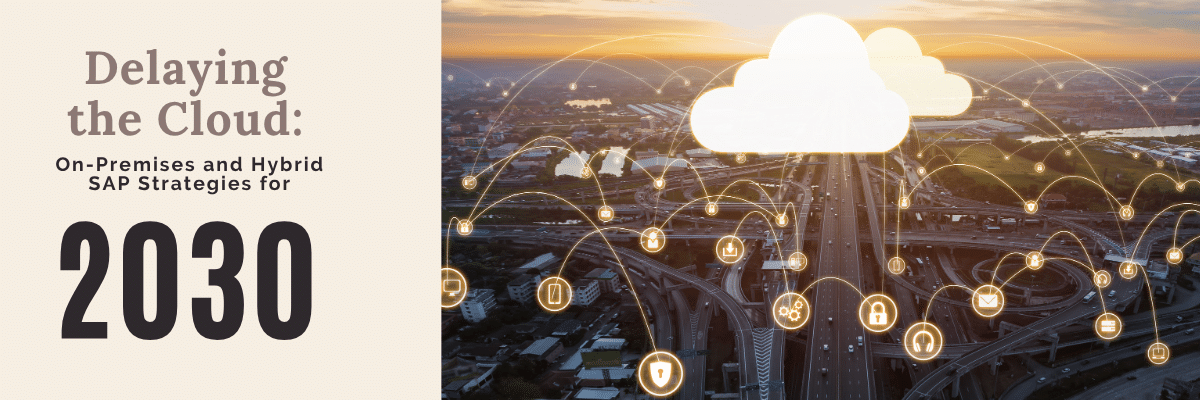.png?width=1200&height=1200&name=Untitled%20design%20(2).png)
On-Premises and Hybrid SAP Strategies for 2030
Delaying the Cloud: On-Premises and Hybrid SAP Strategies for 2030
As the 2030 SAP mandate to phase out ECC (ERP Central Component) support approaches, some companies face a pivotal decision: migrate to SAP S/4HANA in the cloud, maintain on-premises systems, or adopt a hybrid approach. While SAP’s RISE with SAP program promotes cloud adoption, not every organization is ready to make the leap due to cost, complexity, or dependencies on legacy systems. At FirstCall Consulting, we’ve helped firms navigate these challenges with tailored staffing solutions. Let’s explore the on-premises and hybrid strategies to delay cloud migration while preparing for 2030, ensuring stability and cost efficiency.

Understanding the 2030 SAP Mandate
SAP announced that mainstream support for ECC will end in 2027, with extended maintenance available until 2030 (SAP Roadmap). After this, organizations face risks like no security updates, compliance gaps, and increased costs for custom support. For mid-sized firms, the pressure is on to plan now, but immediate cloud migration may not suit every budget or timeline. On-premise and hybrid strategies offer viable alternatives, allowing IT leaders to maintain control while aligning with long-term S/4HANA goals.
Why Delay the Cloud?
Mid-sized enterprises often hesitate to adopt cloud-based S/4HANA due to:
- High Costs: Cloud migrations require significant upfront investment in licensing, infrastructure, and training, which can strain budgets for many firms.
- Legacy System Dependencies: Custom ECC configurations (e.g., FI/CO, MM modules) may not easily translate to cloud environments, requiring complex reengineering.
- Operational Stability: Firms with stable ECC systems prioritize continuity over disruptive migrations, especially during economic uncertainty.
- Data Security Concerns: Regulated industries (e.g., manufacturing, life sciences) may prefer on-premise control to meet compliance needs like CMMC.
For certain organizations, delaying the cloud can buy time to optimize existing systems while planning a phased S/4HANA transition.
On-Premise Strategy: Extending ECC Lifespan
SAP’s Extended Maintenance program allows firms to continue ECC support until 2030, providing a window to maximize existing investments.
Key Steps for On-Premises Success
Optimize ECC Performance: Conduct a system health check to streamline modules (e.g., SD, MM) and reduce technical debt. FirstCall’s complete staffing solutions can enhance uptime and efficiency.
Strengthen Security: Implement patches and compliance measures (e.g., CMMC readiness) to mitigate risks post-2027. Our expert support ensures robust security without cloud dependency.
Upskill Teams: Train in-house staff on ECC optimization or leverage FirstCall’s functional experts to fill gaps.
Plan for S/4HANA On-Premises: Transition to S/4HANA on-premises as a steppingstone, preserving customizations while preparing for future cloud adoption.
Benefits and Risks
- Benefits: Lower upfront costs, control over data, and continuity for legacy processes.
- Risks: Slightly higher maintenance fees post-2027 and potential skill shortages. FirstCall mitigates this with complete staffing solutions, ensuring long-term stability. We can help your organization estimate these cost increases. It may not be as much as you think.
Hybrid Strategy: Balancing ECC and S/4HANA
A hybrid approach blends ECC on-premise with selective S/4HANA deployments (cloud or on-premise). This strategy balances modernization with stability.
Key Steps for Hybrid Success
Prioritize Modules for Migration: Move high-value modules (e.g., FI/CO for real-time analytics) to S/4HANA cloud while keeping others (e.g., MM) on ECC. FirstCall’s module-specific support ensures seamless integration.
Leverage SAP Fiori: Enhance ECC user experience with Fiori’s modern interface, available on-premise or hybrid (SAP Fiori). Our functional teams can deploy Fiori to boost productivity without full cloud adoption.
Use Hybrid Infrastructure: Combine on-premise ECC with SAP HANA Enterprise Cloud for select workloads, reducing costs while testing cloud benefits.
Staff Flexibly: FirstCall’s supplemental support fills gaps (e.g., SD expertise during peak seasons) while your in-house team focuses on core operations.
Benefits and Risks
- Benefits: Gradual modernization, cost flexibility, and improved UX with Fiori.
- Risks: Integration complexity and potential data silos. FirstCall’s expertise support minimizes these challenges.
Why Choose FirstCall for Your 2030 Strategy?
Whether you need a complete SAP staff or supplemental module support, FirstCall Consulting delivers tailored solutions to navigate the 2030 mandate. Our proven track record ensures your ECC system remains robust while preparing for S/4HANA. We offer:
- Complete SAP Teams: End-to-end functional and Basis support for on-premise ECC or S/4HANA transitions.
- Supplemental Expertise: Module-specific support (e.g., FI/CO, MM, SD) to stabilize hybrid environments.
- Cost Efficiency: Strategies that maximize ROI, avoiding premature cloud investments.
- Industry Excellence: FirstCall has 16+ years of SAP experience, and our consultants average 22+ years of SAP and business experience. We also offer an Enterprise Architect practice (one of the few in the US) to help advise on your S4 journey.
Next Steps: Plan Now for 2030
The 2030 SAP mandate is a wake-up call, but firms don’t need to rush to the cloud. On-premises and hybrid strategies, supported by FirstCall’s staffing expertise, offer flexibility and control. Start by assessing your ECC landscape and defining your S/4HANA path.


.png?width=1200&height=1200&name=Untitled%20design%20(1).png)